#disabled autonomy
Explore tagged Tumblr posts
Text
ALWAYS ask before touching someone’s mobility aid!
even if they drop it, even if it’s out of arms reach, there is nothing wrong with asking before helping, and many of us prefer it.
#mobility aid user#mobility aids#disability awareness#disabled queer#chronic pain#walking canes#cane user#cripple punk#disability#disability rights#disabled autonomy
81 notes
·
View notes
Text
“We have a right to autonomy, to make our own decisions—even when we make mistakes. We have a right to make mistakes.”
Jules Edwards
I Will Die On This Hill
#Jules Edwards#i will die on this hill#autism#autistic adults#autistic self advocacy#self determination#autonomy#disabled autonomy#disability#disability quotes#disability justice#autism quotes#quotes#books#book quotes#bookblr#actually autistic#autistic
6 notes
·
View notes
Text
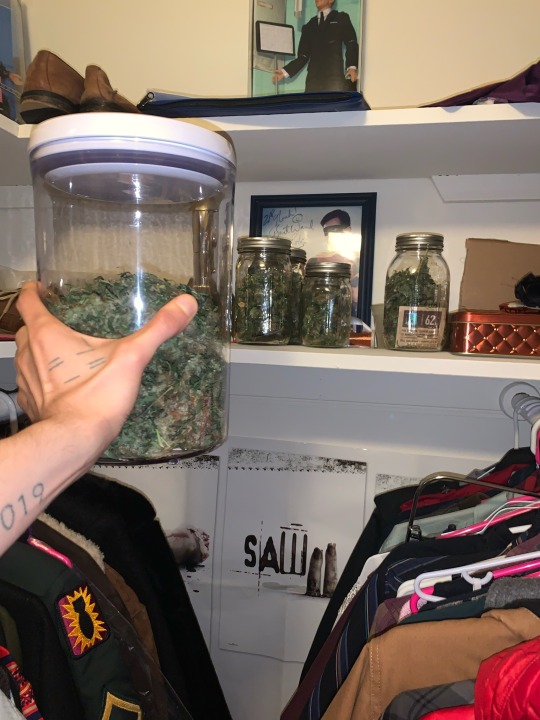
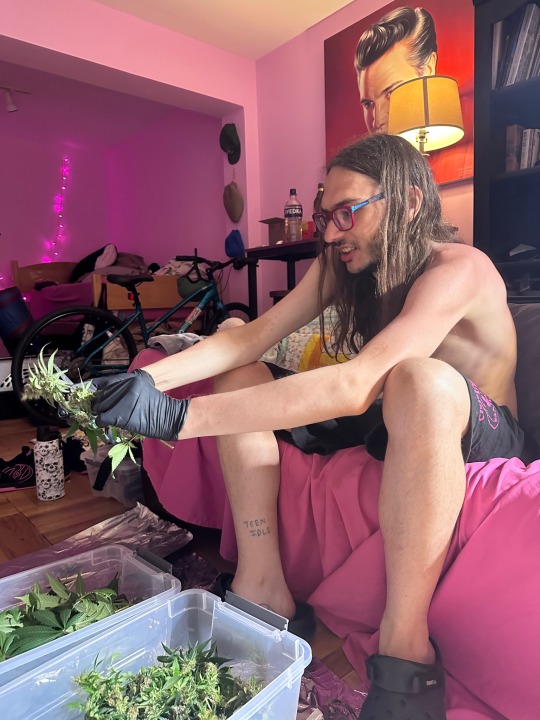
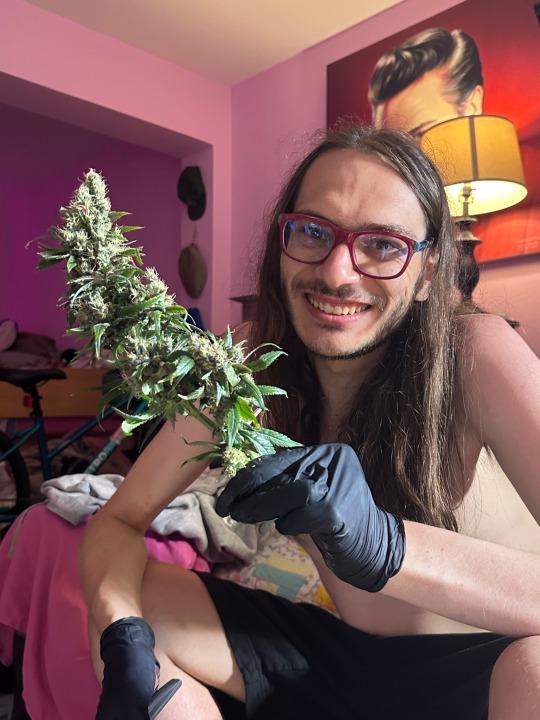
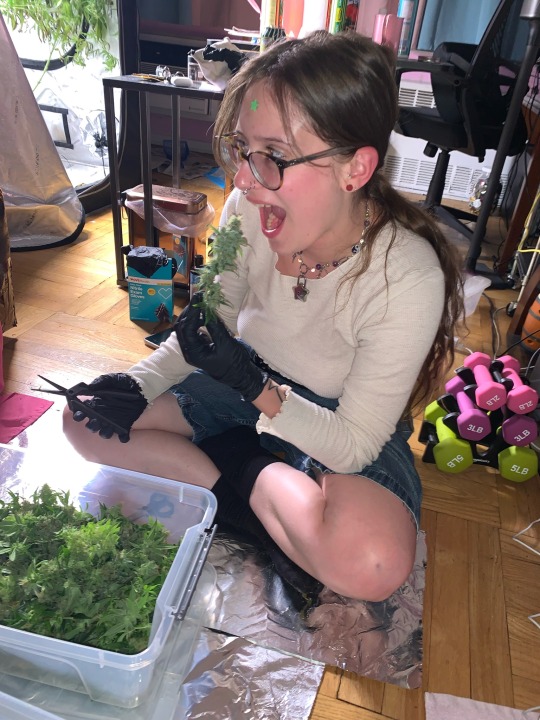
we finally harvested my two girls , frani and miranda 🪴🪴
lately i've been working on selectively breeding Zkittlez to make an ultimate anti-seizure / anti-autoimmune-disease-pain medicine .
#addisons disease#pernicious anemia#seizures#epilepsy#disabled activism#disabled autonomy#adrenal insufficiency
4 notes
·
View notes
Text
I wish that instead of talking about “independent living” as disabled people we talked more about “autonomous living”.
I think when a lot of people see “independent” they assume it means living alone without other people. And some people assume that independent living services aren’t for them because they need 24/7 care. Or non disabled people think it’s pointless because many disabled people can’t live on their own.
But what we call independent living often includes having access to carers/ PAs/ support workers. It’s about having freedom to make all the meaningful choices we can, having the support and equipment we need to live comfortably and safely and to access the community and other activities. And I feel like “autonomous living” describes that better.
8K notes
·
View notes
Text
Disabled people are people. Therefore you can’t start touching me or grabbing my things without permission. If I say don’t touch me you do not ignore my wishes because I’m disabled. Just like any other person I have a right to autonomy over my body and my decisions. Unless you have been given permission or it’s an emergency, you cannot simply start touching me. I’m not an object I am a person. Being disabled doesn’t mean you, a random stranger get to make decisions for me. If it seems someone is in need of help ask them. If they say no you don’t then forcefully help them because you think you know better than them what they need.
#disability#disabled#cripple#chronic illness#mobility aid user#mobility issues#cripple punk#cpunk#angry cripple#disability advocacy#disability rights#bodily autonomy#human rights#disabled awareness#disabled activism
755 notes
·
View notes
Text
i was reading the recipe suggestions on some of the cans of mackerel i have in my cupboard, and I've noticed that on all of the recipe suggestions for pasta, seafood, anything really say "try this for a low-calorie, low carb, low fat, low sugar dinner". you. need those things when it comes to be mealtime. calories are a measure of how much "energy" you can burn, not how much weight you will gain from eating the food. carbohydrates get broken down into starches, sugars, and fibers, which are all necessary for you to function.
your brain & body operate primarily off of fats, sugars, and proteins, but i've noticed that protein is the only thing we push as absolutely necessary, which just isn't true. whenever you idle and not in motion, your body has nothing to do with the extra protein you're bringing in. it will be stored as extra fat if you do not give that protein a reason to build muscle tissue instead.
your brain consumes 20% or more of the sugar you take into your body- our brains NEED glucose, you literally need sugar to think. if you feel depressed and like you're sluggish reacting to things, thinking, remembering things, and other mental processes, if you are the kind of person who refuses to eat any sugar at all due to wanting to be skinny, you are doing your brain a huge disservice:

i can't stand the hatred towards dietary fats, because it's causing so many people to be outright miserable or even sick. you need fats to function. they are an excellent source of energy and are literally required for you to be able to move, think, and combat disease. they are not this icky thing that you need to avoid at all costs. fats are extremely important for brain development, as well as brain function, and even immune system function:
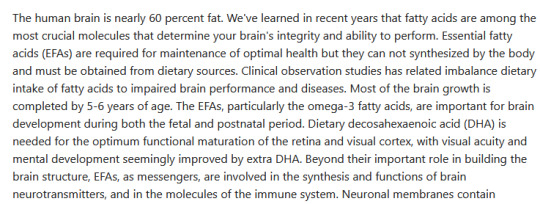
also for many people, 2,000 calories or less per day is nowhere near enough. your brain actively consumes calories, fats and sugars while you are awake, no matter what you are doing:

i sincerely refuse to believe that if JUST YOUR BRAIN ALONE consumes somewhere in the ballpark of 400-500 calories just for being awake and active that we can only survive off of 2,000 calories a day. capitalism, diet culture and fat shaming forcing us to starve ourselves of vital nutrients so we are weak and too tired to fight back against the bullshit we face every day. food is important.
food isn't just to satiate the feeling of an empty stomach. it is the ONLY way you get vital fuel in order to keep moving, living, thinking, and breathing. vitamins and minerals are NOT the only vital aspects of food. you're not meant to restrict how many nutrients you get at FUCKING MEAL TIMES. YOU NEED FUEL. PLEASE FUEL YOUR BODY AND BRAIN. A CONVENTIONALLY ATTRACTIVE BODY ISN'T WORTH SUFFERING AND LIVING YOUR WORST LIFE!!!!!!!!!!!!!!!!!!!!!!!
#punk#trans punks#trans punx#queer punks#queer punk#cripple punk#crip punk#cpunk#cripplepunk#disability#disabled#actually disabled#humanitarian#humanitarianism#health#our writing#fat liberation#body image#fat lib#body liberation#bodily autonomy#body autonomy#weight#food mention#diet culture#physical health#fuck diet culture
894 notes
·
View notes
Text
Friendly reminder that if you support reproductive rights and bodily autonomy but say that disabled people shouldn't have children because they'll pass down their genes which is "cruel" or "abusive", you do not support reproductive rights and bodily autonomy. Reproductive rights do not only concern abortion for cis white abled women.
#in a world where people are not ableist and people can get accomodations disability is not pure suffering#so if you want disabled children to have good lives advocate for disabled people#do not support eug*nics#disabled problems#disabled#actually disabled#disability rights#disability#ableism#mental illness#neurodivergent#physical disability#chronically ill#chronic illness#neurological disorder#reproductive autonomy#reproductive rights#feminism
8K notes
·
View notes
Text
hot take that should be much more lukewarm than it is: if your feminism doesn't have room for piercings and tattoos and dyed hair and collars and animal ear headbands and stuff like that, it's not really all that feminist.
people can just do what they want. if they want to get cosmetic surgeries or use different names or pronouns or dress "weird" those things are just allowed. cringe is dead. doing things that don't affect others in any meaningful way but make you feel good is good.
people can decorate their mobility aids. wear clothes with metal studs on them. go out in horrendously loud tie-dye mess clothes. we love that. that's bodily autonomy for you.
being loudly queer and gay and trans and a feminist and disabled and a legitimate animal and a furry is cool as fuck actually it's 2023.
use whatever swear words you want. the weird old WASPs giving you stares are because they're not as cool as you.
this also goes for kinks and those who (safely and consensually) practice them btw, even that one you find weird.
"bodily autonomy but only for people who make the same decisions as me about how to decorate and use theirs" isn't good feminism practices.
go forth and be safe ofc but above all be yourself
#feminism#radical feminist unsafe#alt fashion#bodily autonomy#kink safety#kink stuff#disability#transgender#lgbtq#lgbtqiia+#trans#disability pride month#actually disabled#therian#otherkin
2K notes
·
View notes
Text
Spanning nearly two centuries of global history, the basic pattern of trans misogyny is much older than TERFs, or right-wing Christians, and extremely consistent. Trans misogyny is not a mere psychological and irrational hatred of trans women. In fact, trans misogyny as a concept helps explain how individuals, or interpersonal violence, can act on behalf of the state or other abstract political movements. At the interpersonal scale, however, trans misogyny testifies to the uncomfortable thickness of social bonds across hierarchies of gender, class, and race. When a straight man lashes out after dating or having sex with a trans woman, he is often afraid of the implication that his sexuality is joined to hers. When a gay man anxiously keeps trans women out of his activism or social circles, he is often fearful of their common stigma as feminine. And when a non-trans feminist claims she is erased by trans women’s access to a bathroom, she is often afraid that their shared vulnerability as feminized people will be magnified intolerably by trans women’s presence. In each case, trans misogyny displays a fear of interdependence and a refusal of solidarity. It is felt as a fear of proximity. Trans femininity is too sociable, too connected to everyone –– too exuberant about stigmatized femininity –– and many people fear the excess of trans femininity and sexuality by getting too close. But sociability can never be confined or blamed on one person in a relationship; it's impersonal, and it sticks to everyone.
The defensive fear and projection build into trans misogyny, whether genuine or performed, is an attempt to wish away what it nonetheless recognizes: that trans femininity is an integral part of the social fabric. There will be no emancipation for anyone until we embrace trans femininity's centrality and value.
Jules Gill-Peterson, A Short History of Trans Misogyny.
#yes i have a pre print copy no i should not have a pre print copy yes i am posting mic drops anyway#jules gill peterson#transmisogyny#readings#interdependence#autonomy#disability#community#relationships#mine
909 notes
·
View notes
Text
It's seriously nobody's business if a disabled person wants to have a child.
It's just nobody's place to tell us whether we can handle parenthood. That's up to us. It's our lives and our choices to make.
Being disabled doesn't mean we can't be parents, whether by birthing, fostering, or adopting. It's a decision that involves us, our partners, and our doctors. Not random people who think they know our bodies better than we do.
#disabled community#cripple punk#eugenics#ableism#bodily autonomy#pro choice#spoonie community#disabled joy
216 notes
·
View notes
Text
fat people do not have to be healthy to be deserving of respect and rights like bodily autonomy. yes, including if we experience health issues related to our weight (whether directly or indirectly). disability is not a moral issue.
also. fat people are allowed to make whatever health choices are best for them, and that does not have to involve weight loss. in fact, sometimes weight loss can make things worse, compared to our baseline. generally, dont assume anything about someone's health needs based on their appearance.
#softspoonie#fatness#fat liberation#disability justice#disabled#disability#body autonomy#bodily autonomy#weight loss tw#weight tw
431 notes
·
View notes
Text
Help Me Get New Mobility Aids!!!
Happy Disability Pride Month! I initially wasnt going to make a post to try to get new mobility aids/tools, but I really need them, so what the hell.
I am a multiply disabled Black lesbian and I have been without proper supportive mobility since the start of the pandemic. I had many of my things broken or thrown away during this time period, and I thought I could go without but its been so long and I really cant anymore.
I need smart/ergonomic forearm crutches because regular forearm crutches wreck my fragile hypermobile wrists, I need braces for both legs and ankles, a shower bench and detachable showerhead. All of this combined is a bit over $550.


I REALLY need this, esp the crutches! My mobility and bodily autonomy would be GREATLY increased If I was able to get these items. I
CA: $sleepyhen
VN: wildwotko
Dm for P@ypal
TLDR?: Disabled Black Lesbian needs new mobility aids for increased mobility and autonomy.
#disability pride month#disabled poc#heds#ehlers danlos syndrome#chronic pain#black and disabled#disabled lesbian#This is really vital to my life right now bc i cant do things atm#crutches would make me doing things by myself again possible#i just want some more mobility and bodily autonomy
2K notes
·
View notes
Text
“My right to self-determination includes the right to make bad choices sometimes.”
Cole Sorenson
“And Why Would We Do This?”
Published in I Will Die On This Hill
#Cole sorenson#and why would we do this?#i will die on this hill#autism#autistic adults#high support needs#high needs autism#nonspeakers#nonspeaking voices#nonspeaking autism#self determination#autonomy#disabled autonomy#disability#disability quotes#autistic adult#autism quotes#autism book club#quotes#books#book quotes#bookblr#actually autistic
4 notes
·
View notes
Text
Even though I loved the writing of LoL Jayvik I really appreciate that Arcane is going for a different approach so far, makes things feel less predictable! Instead of ideological differences driving the divide between them it is more so that they are just... out of sync so far?? I mean, during last season Viktor even before his diagnosis was eagerly meddling with the Hexcore with little regard to safety, then straight up went for the illicit and damaging drug to facilitate the transformation process, then when he ran out of that drug he proceeded to try using Hexcore without it (when he already TESTED that on plants and should have known it would backfire) which killed Sky... At which point he went oh shit, ok, I should stop meddling with this thing and just die peacefully maybe. It's not very clear how much of that he told Jayce aside from making him promise to destroy the Hexcore, but Jayce's surprised reaction in s2 when hearing about Sky makes me think it wasn't much at all...? So Jayce doesn't feel as much of an asshole for, once again, going against Viktor's explicit wishes. He pretty much never has the full picture before being forced to make a decision! Idk it makes him very sympathetic to me ngl, just feeling more and more guilt but continuing to fuck up due to lack of knowledge and experience, is that not relatable? And aside from being entirely unprepared for Viktor's death even after s1 I think it's like Jinx says in this Act too, it was something he could fix for once... Perhaps this is why he agrees to the use of Hextech weapons, too, feeling like it's the only thing he can do to 'help' the people he cares about and protect himself too (I guess killing just 1 defenseless child wasn't enough of a learning moment for him lmao). Despite again, this going very much against Viktor's wishes (and Mel's!! we didn't get her with Jayce after this but I imagine she's not very happy with him either... Viktor&Mel team up when). This time Jayce is the one just going for it and hoping for the best despite knowing very little of how it works. I also love how a lot of us in the fandom and also Singed in the series assumed Jayce would be appalled by Viktor's experiments but instead... he immediately goes even further :D And when Viktor wakes up and goes bye Jayce is like ?? but then by the end of the next episode he starts to realise that ohh alright so maybe yeah they should have stopped... Who'd have thunk. I'm not super up to date with League lore but is it really that difficult to find a sane mage for consultation purposes? ...Also I really doubt that hitting that thing (wild rune?) with his hextech-powered hammer was a good move lmao and yet even in this it seems similar to what Viktor is currently doing. Both continue to use the arcane to try and fix things, Jayce through violence and Viktor through transmutation, but it kind of seems like the same kind of mistake. (they are just pretty bad scientists and always have been and i love that for them lmao)
#arcane spoilers#arcane s2 spoilers#jayvik#jayce arcane#viktor arcane#and i do love how it's jayce making the call to turn viktor into a magical being#sure it robs viktor of his autonomy but#that makes sense for a disabled character in a bitter way i think#and im sure viktor will take a lot of that agency back now that he's starting a cult#and jayce can swim in his ocean of guilt for this foreverrr#text#long post#arcane
113 notes
·
View notes
Text
We don't talk enough about how forced sterilization of disabled people is legal in many states.
Disabled people deserve bodily autonomy as much as anyone else.
#disability#disabilities#actually disabled#bodily autonomy#forced sterilization#us politics#ableism#legal discrimination#discrimation#disabled#disabled pride month
991 notes
·
View notes
Text
Independence vs. Autonomy
I keep seeing posts that make it clear that most people don’t have an understanding of the difference between independence and autonomy when discussing disability. This is especially clear during discussions surrounding aides and caregivers.
Independence is not needing help from anyone. While many people believe that they are totally independent, in reality true independence is a lie. All humans are interdependent. Unless you’re all alone in the middle of nowhere in a cabin you built yourself, growing you own food, making your own clothes, and crossing your fingers for luck if you get sick or hurt, you’re not independent (and even then, there’s dependence on nature, someone obviously birthed and raised you, humans need social interaction, etc).
In contrast, autonomy is having free will, or the ability to choose what you say and do and how.
Obviously, these two concepts are interrelated. People who are more independent in the typical activities society expects usually have significantly more autonomy than those who need more help from others. However, this is not always true.
Someone who can take care of themself and their living space independently but uses up so much time and energy doing so that they don’t have the ability to do things they want to do, such as hobbies and socializing, has high independence but low autonomy.
On the other hand, someone who needs 24/7 care but is able to direct that care and live their life how they want and do what’s important to them has low independence but high autonomy.
Obviosuly, there are situations where increasing independence is very important, primarily when it relates to safety, but in most cases, independence is not what’s most important, autonomy is.
#actually autistic#disability#autonomy#obviously tumblr users are not the only ones who don’t know this#considering most of this post is taken verbatim from the trainings I regularly give at work
62 notes
·
View notes